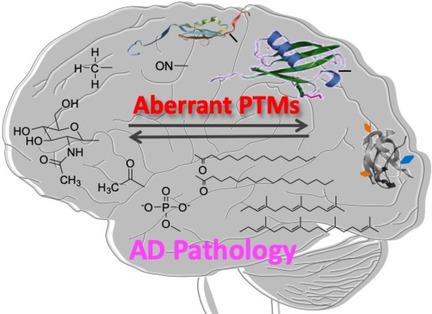当前位置:
X-MOL 学术
›
ChemBioChem
›
论文详情
Our official English website, www.x-mol.net, welcomes your feedback! (Note: you will need to create a separate account there.)
Role of Post-translational Modifications in Alzheimer's Disease.
ChemBioChem ( IF 3.2 ) Pub Date : 2020-01-30 , DOI: 10.1002/cbic.201900573 Madhu Ramesh 1 , Pushparathinam Gopinath 2 , Thimmaiah Govindaraju 1
ChemBioChem ( IF 3.2 ) Pub Date : 2020-01-30 , DOI: 10.1002/cbic.201900573 Madhu Ramesh 1 , Pushparathinam Gopinath 2 , Thimmaiah Govindaraju 1
Affiliation

|
The global burden of Alzheimer's disease (AD) is growing. Valiant efforts to develop clinical candidates for treatment have continuously met with failure. Currently available palliative treatments are temporary and there is a constant need to search for reliable disease pathways, biomarkers and drug targets for developing diagnostic and therapeutic tools to address the unmet medical needs of AD. Challenges in drug-discovery efforts raise further questions about the strategies of current conventional diagnosis; drug design; and understanding of disease pathways, biomarkers and targets. In this context, post-translational modifications (PTMs) regulate protein trafficking, function and degradation, and their in-depth study plays a significant role in the identification of novel biomarkers and drug targets. Aberrant PTMs of disease-relevant proteins could trigger pathological pathways, leading to disease progression. Advancements in proteomics enable the generation of patterns or signatures of such modifications, and thus, provide a versatile platform to develop biomarkers based on PTMs. In addition, understanding and targeting the aberrant PTMs of various proteins provide viable avenues for addressing AD drug-discovery challenges. This review highlights numerous PTMs of proteins relevant to AD and provides an overview of their adverse effects on the protein structure, function and aggregation propensity that contribute to the disease pathology. A critical discussion offers suggestions of methods to develop PTM signatures and interfere with aberrant PTMs to develop viable diagnostic and therapeutic interventions in AD.
中文翻译:

翻译后修饰在阿尔茨海默氏病中的作用。
阿尔茨海默氏病(AD)的全球负担正在增加。开发临床候选疗法的英勇努力一直失败。当前可用的姑息治疗是暂时的,并且持续需要寻找可靠的疾病途径,生物标记物和药物靶标,以开发诊断和治疗工具来解决AD的未满足的医学需求。药物发现工作中的挑战对当前的常规诊断策略提出了进一步的疑问。药物设计;以及对疾病途径,生物标志物和靶标的了解。在这种情况下,翻译后修饰(PTM)调节蛋白质的运输,功能和降解,其深入研究在鉴定新型生物标志物和药物靶标中起着重要作用。与疾病相关的蛋白质的异常PTM可能触发病理途径,从而导致疾病进展。蛋白质组学的进步使得能够生成这种修饰的模式或特征,因此,提供了开发基于PTM的生物标记的通用平台。此外,了解和靶向各种蛋白质的异常PTMs为解决AD药物发现挑战提供了可行的途径。这篇综述重点介绍了许多与AD相关的蛋白质PTM,并概述了它们对导致疾病病理的蛋白质结构,功能和聚集倾向的不利影响。严格的讨论为开发PTM签名并干扰异常PTM从而在AD中开发可行的诊断和治疗干预方法提供了建议。
更新日期:2020-01-30
中文翻译:

翻译后修饰在阿尔茨海默氏病中的作用。
阿尔茨海默氏病(AD)的全球负担正在增加。开发临床候选疗法的英勇努力一直失败。当前可用的姑息治疗是暂时的,并且持续需要寻找可靠的疾病途径,生物标记物和药物靶标,以开发诊断和治疗工具来解决AD的未满足的医学需求。药物发现工作中的挑战对当前的常规诊断策略提出了进一步的疑问。药物设计;以及对疾病途径,生物标志物和靶标的了解。在这种情况下,翻译后修饰(PTM)调节蛋白质的运输,功能和降解,其深入研究在鉴定新型生物标志物和药物靶标中起着重要作用。与疾病相关的蛋白质的异常PTM可能触发病理途径,从而导致疾病进展。蛋白质组学的进步使得能够生成这种修饰的模式或特征,因此,提供了开发基于PTM的生物标记的通用平台。此外,了解和靶向各种蛋白质的异常PTMs为解决AD药物发现挑战提供了可行的途径。这篇综述重点介绍了许多与AD相关的蛋白质PTM,并概述了它们对导致疾病病理的蛋白质结构,功能和聚集倾向的不利影响。严格的讨论为开发PTM签名并干扰异常PTM从而在AD中开发可行的诊断和治疗干预方法提供了建议。



























 京公网安备 11010802027423号
京公网安备 11010802027423号